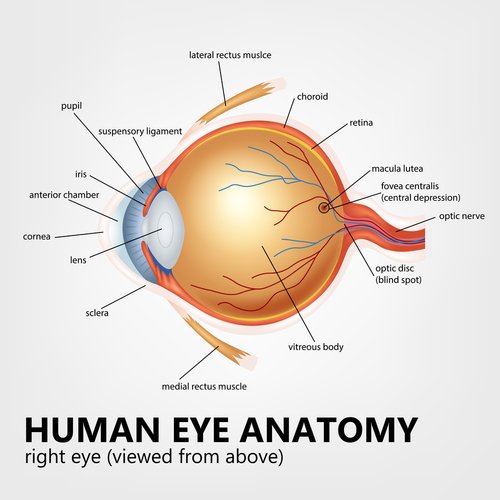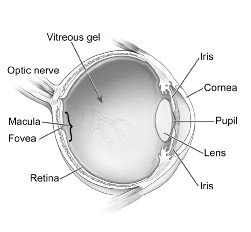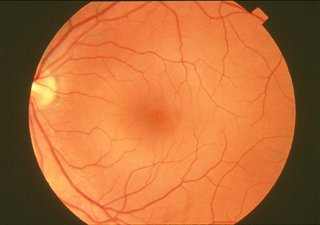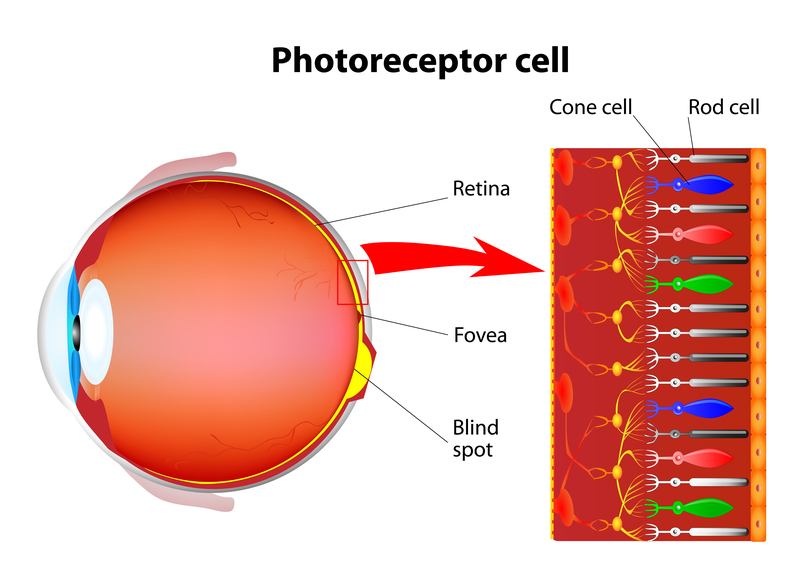Macula Lutea
The macula lutea is a tiny, but vital spot in the retina responsible for our central vision.
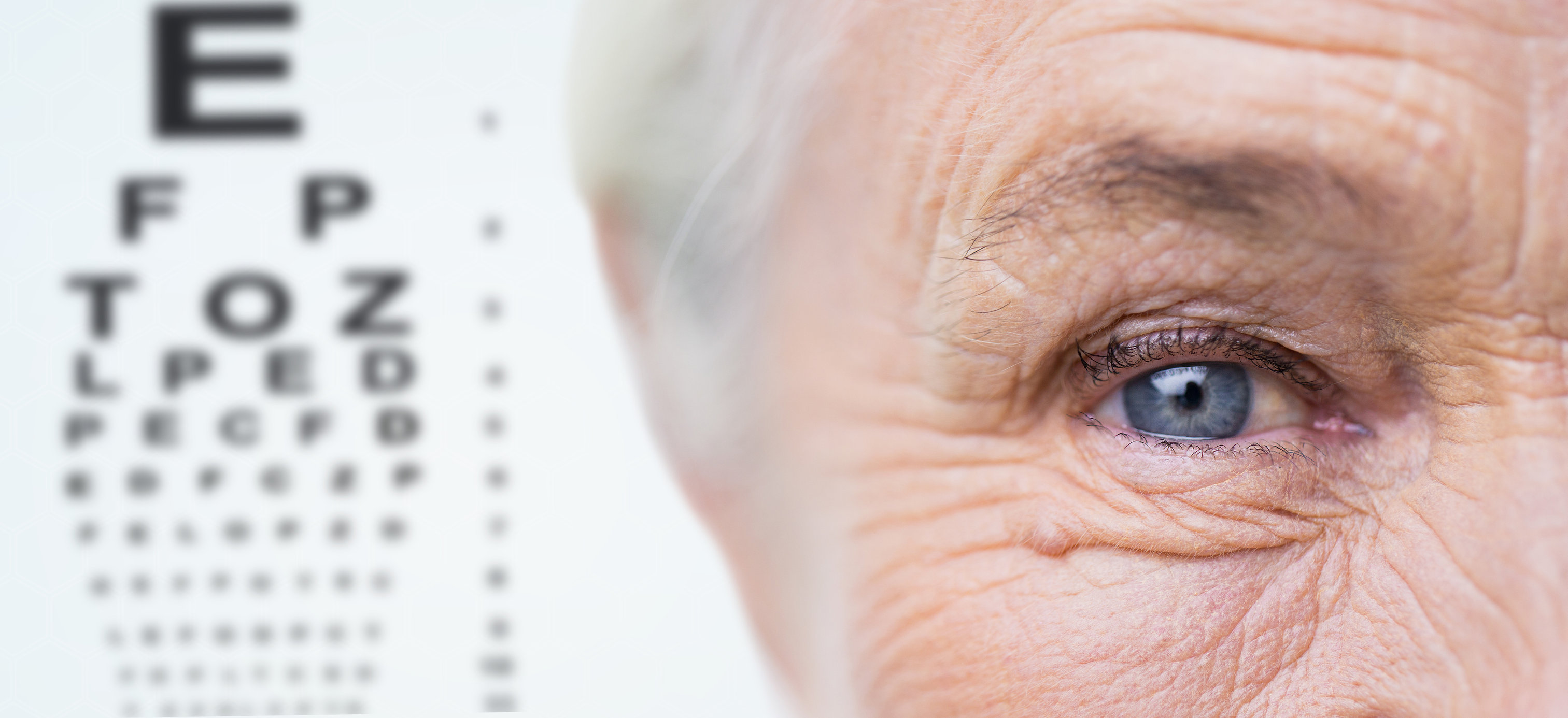
In Latin "macula" means spot and "lutea' means yellow. Indeed on a fundus or picture of the retina it shows up as a yellowish spot. The macula is responsible for our straight ahead or central vision as well as our sharp, detailed vision.
The macula is the red spot just above the optic nerve in this picture.
This small spot is:
√ A yellow, oval spot located in the center of the retina at the back of the eye also called the fovea
√ Very small - about the size of a grain of rice
√ Responsible for our detailed vision - such as reading, and doing fine tasks like sewing
√ Responsible for our straight ahead or central vision - needed to see faces or to watch TV. The rest of the retina is responsible for our peripheral or side vision
√ A light sensitive layer of tissue
√ Responsible for our color perception
√ Consists of high concentration of cone cells
Made up mainly of cone cells (photoreceptor cells responsible for color vision). It does not have rod cells. It has the densest concentration of cones in the eye.
√ Absent of blood vessels so it gets its oxygen from the choroid layer of the retina
√ Latin, meaning pit or pitfall. There is in fact a small depression or dimple in the macula
Macula Lutea: It's Role In Macular Diseases
Here you can see from this picture where the macula lutea/fovea is located. The fovea is in the center of the macula.
The fovea is critical for our vision. It is the part of the eye we use when we are focused on reading a page, looking at a picture, or seeing a face.
The health of this tiny center of the retina is dependent on how well the layers of tissue function that feed it and remove built up waste material. These layers are:
1) The Choroid
- Rich with capillaries and supplies blood and oxygen to the photoreceptor cells
2) Bruch's Membrane
3) The Retinal Pigment Epithelium
- provides oxygen and nutrients from the choroid layer to the
photoreceptor cells; also removes and transport built up waste away from
the rods and cones back to the choroid capillaries
4) Photoreceptor Cells are cells that convert light into electrical messages. These messages are sent to the optic nerve which then goes to the brain.
As we age, the supporting tissue to the macula are not functioning as well and do not get the needed nutrients and oxygen to these cells. The transport of these nutrients are affected as well as the removal of waste products.
When this happens the photoreceptor cells begin to degenerate and/or die which leads to macular degeneration.
If the macula degenerates there is a loss of central and detailed vision, making it difficult to read, drive or to recognize faces.
Some of the common symptoms of macular degeneration are blurred vision and straight lines appearing wavy. There are earlier symptoms of retinal changes that can be detected by your eye specialist.
Macular Disease
As we age, the supporting tissue to the macula are not functioning as well and do not get the needed nutrients and oxygen to these cells. The transport of these nutrients are affected as well as the removal of waste products.
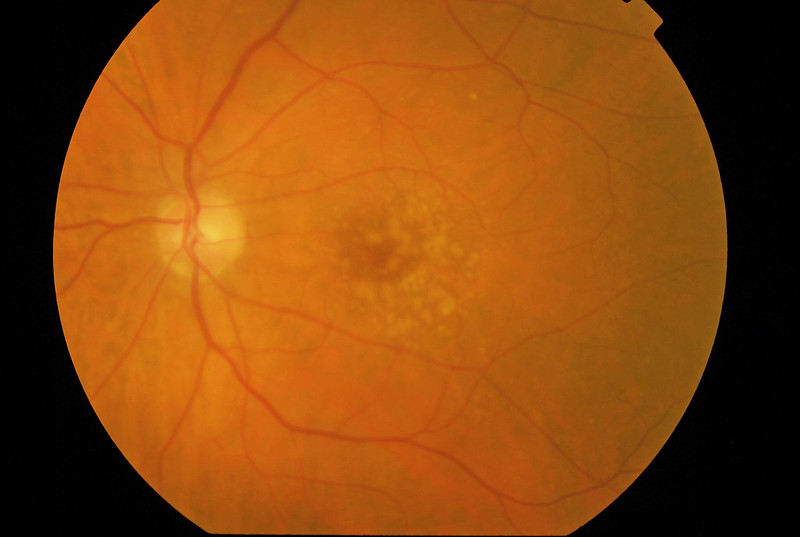
There are several conditions that affect this specialized center of the retina. They are:
1) Macular Edema - this edema or swelling is caused by fluid leaking into this area from retinal blood vessels. The swelling causes the tissue to raise and causes a distortion of vision
2) Age Related Macular Degeneration (AMD) occurs when the layers supporting this tissue become clogged and inefficient and the photoreceptors in the center of the retina degenerate and die.
Because the macula lutea is responsible for central, detailed and color vision, you can understand why these functions are lost when a person develops age related macular degeneration.
Go from Macula Lutea to Definition of Macular Degeneration
Go from Macula Lutea to WebRN Macular Degeneration Home
√ Prevention of Macular Degeneration?
√ Tips for Daily Living?
√ Food Suggestions for a Macular Degeneration Diet?
√ Ideas on Visual Aids to Maximize your Sight?
If you said "yes" to any of the above, sign up for the monthly Macular Degeneration News.
